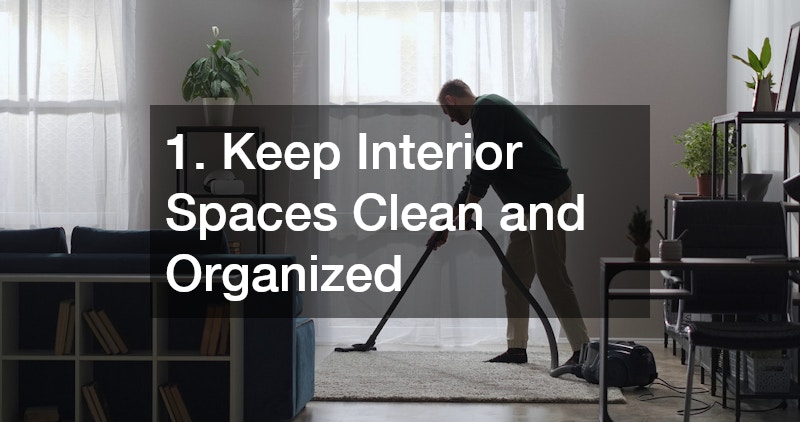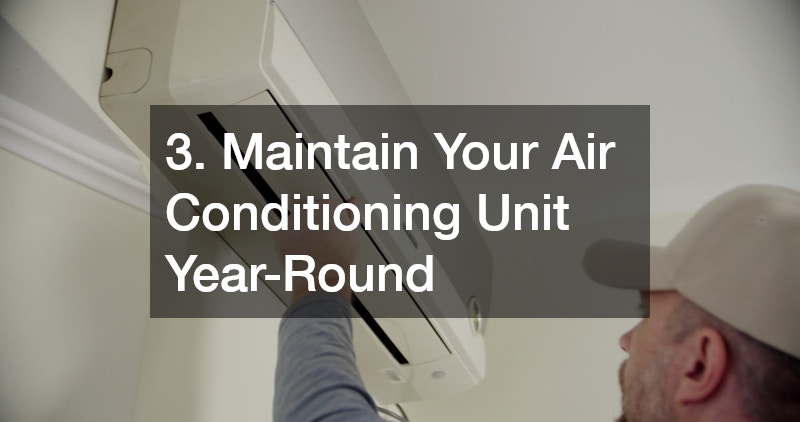Maintaining a clean, efficient home doesn’t have to be complicated or time-consuming. In fact, a minimalist approach emphasizes intentional habits, streamlined routines, and thoughtful upkeep to create a space that is functional, organized, and stress-free. By focusing on essential systems, surfaces, and structures, homeowners can prevent problems before they arise, extend the life of their home’s components, and reduce unnecessary clutter and waste.
Small, consistent efforts—rather than sporadic deep cleans or emergency repairs—ensure long-term efficiency. Minimalism encourages prioritizing maintenance tasks that truly matter while removing distractions and over-complication from daily routines. From keeping interior spaces organized to monitoring essential systems like roofing, plumbing, and electrical components, a holistic approach ensures the home operates smoothly and remains visually appealing.
This guide explores ten key areas for homeowners seeking a minimalist, high-efficiency strategy for home maintenance. Each section includes actionable tips, professional service recommendations, and small steps that yield big results over time. Incorporating these methods creates a home that is not only clean and efficient but also safer, more comfortable, and easier to manage throughout the year.
1. Keep Interior Spaces Clean and Organized

Maintaining tidy, uncluttered interiors is the cornerstone of minimalist home upkeep. Residential cleaning routines should focus on both daily and seasonal tasks. Daily tidying, like wiping counters, sweeping floors, and decluttering common areas, prevents messes from accumulating and reduces the time required for deep cleaning sessions.
For seasonal upkeep, consider a checklist approach. Rotate tasks like window washing, baseboard cleaning, and dusting ceiling fans, ensuring no area is neglected. Maintaining cabinets, closets, and storage units regularly ensures belongings are orderly and accessible, supporting both aesthetics and efficiency.
Professional residential cleaning services can be helpful for periodic deep cleans, particularly for hard-to-reach spaces, upholstered furniture, or delicate surfaces. By combining personal effort with occasional professional support, homeowners maintain a polished, hygienic environment without feeling overwhelmed. A consistently clean home reduces stress, improves indoor air quality, and supports minimalist living by highlighting functional, necessary items rather than clutter.
2. Monitor Electrical Systems and Perform Timely Repairs
Electrical issues can escalate quickly if left unattended. A minimalist maintenance strategy includes regular inspections of wiring, outlets, and fixtures. Look for frayed cords, flickering lights, or tripped breakers, as these can indicate underlying problems that require prompt attention.
Scheduling routine electrical repair with licensed professionals ensures safety and reliability. Licensed electricians can identify potential hazards, upgrade outdated panels, and prevent overloading circuits. Timely repairs reduce the risk of emergencies like electrical fires or appliance damage.
Simple homeowner actions, such as avoiding overuse of extension cords, keeping outlets unobstructed, and replacing faulty bulbs promptly, complement professional interventions. A proactive approach to electrical systems not only maintains functionality but also reduces anxiety about unseen hazards. By integrating electrical maintenance into a minimalist routine, homeowners protect both people and property efficiently.
3. Maintain Your Air Conditioning Unit Year-Round

A well-functioning air conditioning unit is critical for comfort, efficiency, and energy savings. Minimalist homeowners should establish a routine that includes seasonal inspections, filter replacements, and coil cleaning. Keeping the unit free of dust and debris prevents unnecessary strain on the system and reduces the likelihood of breakdowns during peak usage.
Regular maintenance by qualified technicians ensures refrigerant levels are correct, electrical connections are secure, and airflow is optimal. Neglecting these tasks can lead to decreased efficiency, uneven cooling, and costly emergency repairs.
Supplement professional service with simple homeowner steps, such as keeping vents clear, monitoring thermostat performance, and periodically cleaning accessible components. Consistent attention keeps the system running smoothly, prolongs its lifespan, and contributes to an energy-efficient home environment that aligns with minimalist principles.
4. Protect the Roof and Prevent Water Damage
Residential roofing is a key component of home longevity. Even minor damage, like a loose shingle or clogged gutter, can lead to water infiltration, structural damage, or interior leaks. Minimalist homeowners benefit from scheduled inspections to identify wear, damage, or weak points before problems escalate.
Routine roof maintenance includes clearing debris, checking flashing and vents, and ensuring gutters drain properly. Seasonal inspections can detect issues caused by extreme weather, ice dams, or heavy rainfall. Engaging professionals for repairs or inspections adds a layer of expertise, ensuring work is thorough and long-lasting.
Proper roofing care protects the home’s structural integrity and prevents costly emergencies. Minimalist upkeep focuses on prevention over reaction, helping homeowners maintain a safe, functional, and energy-efficient living environment while reducing unexpected disruptions.
5. Incorporate Sustainable Energy Solutions

Solar panels are a valuable addition for homeowners seeking energy efficiency, lower utility bills, and a reduced environmental footprint. Maintaining them as part of a minimalist home routine ensures they continue to operate effectively without demanding excessive time or effort. Regular cleaning removes dust, pollen, bird droppings, and debris that can block sunlight and reduce energy output. Inspecting mounts, wiring, and inverter systems helps identify early signs of wear, corrosion, or loose connections that could affect performance or safety.
Engaging licensed technicians for periodic inspections provides added assurance that the system is functioning optimally. Professionals can detect issues such as micro-cracks, shading problems, or electrical faults that might go unnoticed during casual checks. Homeowners can also take simple preventative measures themselves, such as trimming overhanging branches, removing leaves, and checking for visible damage to panels or mounts. These small interventions keep panels clear of obstructions and maintain maximum energy efficiency without requiring constant professional oversight.
Monitoring energy output regularly allows homeowners to spot decreases in efficiency early, prompting timely maintenance before more significant problems develop. By integrating solar panel care into a minimalist maintenance schedule, homeowners preserve the longevity and functionality of the system while minimizing unnecessary tasks. This approach balances sustainability, energy savings, and convenience, supporting a home that is both efficient and easy to manage year-round.
6. Maintain Outdoor Spaces with Pressure Washing and Landscaping
Minimalist upkeep extends beyond the interior of a home, emphasizing outdoor maintenance to protect the property, maintain functionality, and enhance visual appeal. Utilizing professional pressure washing services and landscaping services ensures that patios, walkways, driveways, decks, and siding remain clean, safe, and attractive throughout the year. Regular pressure washing removes dirt, mildew, mold, algae, and stains that accumulate over time, preventing surface degradation and prolonging the life of exterior materials. Clean surfaces not only improve aesthetics but also reduce the likelihood of slips, structural damage, and costly emergency repairs.
Landscaping services provide additional support for maintaining a polished outdoor environment. Professionals can handle tasks such as trimming trees and shrubs, mulching garden beds, fertilizing lawns, and monitoring plant health. These services help maintain orderly, well-kept yards that enhance curb appeal and provide functional outdoor living spaces. Proper landscaping also discourages pests, reduces overgrowth, and prevents soil erosion, contributing to the long-term health of the property.
For homeowners who prefer a hands-on approach, incorporating simple DIY tasks complements professional services and keeps the workload manageable. Regular weeding, debris removal, pruning, and seasonal planting maintain order and ensure outdoor areas are safe and inviting. Minimalist routines emphasize consistency over intensity, focusing on essential care tasks rather than frequent, exhaustive labor. By maintaining outdoor spaces thoughtfully, homeowners create usable, attractive, and low-maintenance environments that extend living areas beyond the interior while preserving property value and overall enjoyment.
7. Keep Garage Doors Functioning Efficiently

Garages often serve multiple purposes beyond vehicle storage, acting as workshops, hobby spaces, home gyms, or recreational areas. Maintaining these spaces is essential to ensure they remain safe, functional, and efficient. Timely garage doors maintenance plays a key role in this process, as properly functioning doors improve accessibility, protect stored items, and maintain interior comfort.
Homeowners can take several simple steps to keep garage doors operating smoothly. Lubricating hinges, rollers, and springs reduces friction and wear, while inspecting and replacing weather seals prevents drafts, moisture, and pest intrusion. Clearing debris from tracks and ensuring door alignment enhances safety and prevents accidental damage to vehicles or stored items. Combining these routine tasks with periodic professional checkups ensures the garage door system remains reliable over the long term.
Beyond mechanical function, well-maintained garages support organization and space efficiency. Decluttering, adding storage solutions, and keeping flooring and work surfaces clean transform garages into versatile, multipurpose areas. Homeowners can store seasonal items, maintain hobbies, or create functional workspaces without sacrificing square footage inside the home.
8. Ensure Proper Plumbing Function
Minimalist home maintenance includes keeping plumbing systems efficient, leak-free, and fully operational. Regular inspections of faucets, drains, and exposed pipes help detect early signs of leaks, corrosion, or clogs before they escalate into major issues. Simple interventions, such as clearing minor blockages, checking for slow drains, and monitoring water pressure, maintain system integrity and prevent unnecessary disruptions to daily life. Homeowners who proactively address these small concerns save both time and money while avoiding emergency plumbing situations.
Professional plumbers provide essential expertise for more complex or technical maintenance tasks. Services like pipe repairs, water heater servicing, sewer line inspections, and the replacement of aging fixtures ensure that the entire system operates safely and efficiently. Licensed plumbers can identify hidden issues such as underground leaks, weakened joints, or pressure inconsistencies that may go unnoticed during casual checks.
Integrating routine plumbing checks into a minimalist maintenance schedule keeps the home running smoothly while minimizing unnecessary effort. Scheduling seasonal inspections or combining multiple plumbing tasks into a single service visit streamlines upkeep and maintains consistent system performance. By consistently monitoring and maintaining plumbing infrastructure, homeowners support household efficiency, protect their property, and enjoy peace of mind knowing that both everyday use and emergency scenarios are accounted for.
9. Maintain Flooring, Driveways, and Hardscapes
Asphalt pavers, wood decking, and other hardscape surfaces are essential components of functional and attractive outdoor spaces. Regular maintenance helps protect these investments, keeping them safe, durable, and visually appealing. Routine inspections of paver joints, cracks, or areas of settling prevent tripping hazards and structural degradation. Identifying small issues early allows homeowners to address them before they develop into costly repairs or create unsafe conditions. Pressure washing removes dirt, algae, mold, and grime that accumulate over time, restoring the natural appearance of surfaces while highlighting any hidden damage that requires attention.
Minimalist upkeep emphasizes performing only essential tasks consistently, reducing the time and effort required for maintenance while preserving material longevity. For example, sealing wood decks or asphalt surfaces periodically protects against moisture, UV exposure, and wear from heavy foot or vehicle traffic. Engaging professionals for periodic repairs ensures that surfaces remain structurally sound and prevents minor problems from escalating. Technicians can correct uneven pavers, replace damaged boards, or adjust grading to promote proper drainage, enhancing both safety and aesthetics.
Coordinated care across all hardscape and outdoor elements—such as integrating decks with patios, walkways, and landscape features—creates a cohesive and efficient environment. By combining minimalist routines, strategic professional interventions, and attention to detail, homeowners can enjoy outdoor areas that are functional, attractive, and low-maintenance. Maintaining these surfaces thoughtfully ensures they complement interior spaces, extend usable living areas, and contribute to a home that feels polished, organized, and inviting.
10. Integrate Efficient Lighting and Energy Systems
Thoughtful lighting reduces energy waste and enhances living comfort. Combining efficient interior and exterior solutions, such as residential exterior lighting, supports safety and visual appeal. Minimalist approaches focus on strategic placement, energy-efficient bulbs, and regular maintenance to ensure consistent performance.
Monitoring electrical circuits for lighting systems and integrating automated or timed solutions prevents energy loss. By maintaining lighting systems alongside other home infrastructure, homeowners achieve a streamlined, functional, and energy-conscious home environment.
A minimalist approach to home maintenance prioritizes efficiency, functionality, and long-term durability. By focusing on essential systems like residential roofing, electrical repair, solar panels, air conditioning units, plumbing, and garage doors, homeowners prevent emergencies and reduce ongoing costs. Interior care, including residential cleaning and thoughtful organization, enhances comfort while supporting a streamlined lifestyle.
Outdoor systems, such as landscaping services, asphalt pavers, and decking, extend functional space while maintaining aesthetic appeal. Routine attention, professional support, and strategic interventions across all areas of the home ensure safety, longevity, and visual cohesion.
By combining deliberate, focused maintenance with minimalist principles, homeowners create a clean, efficient, and stress-free living environment. Consistency, prioritization, and preventive care transform ordinary upkeep into a manageable and sustainable routine, maximizing both comfort and investment value over time.
